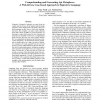Free Online Productivity Tools
i2Speak
i2Symbol
i2OCR
iTex2Img
iWeb2Print
iWeb2Shot
i2Type
iPdf2Split
iPdf2Merge
i2Bopomofo
i2Arabic
i2Style
i2Image
i2PDF
iLatex2Rtf
Sci2ools
111
click to vote
AAAI
2007
2007
Comprehending and Generating Apt Metaphors: A Web-driven, Case-based Approach to Figurative Language
Examples of figurative language can range from the explicit and the obvious to the implicit and downright enigmatic. Some simpler forms, like simile, often wear their meanings on their sleeve, while more challenging forms, like metaphor, can make cryptic allusions more akin to those of riddles or crossword puzzles. In this paper we argue that because the same concepts and properties are described in either case, a computational agent can learn from the easy cases (explicit similes) how to comprehend and generate the hard cases (nonexplicit metaphors). We demonstrate that the markedness of similes allows for a large case-base of illustrative examples to be easily acquired from the web, and present a system, called Sardonicus, that uses this casebase both to understand property-attribution metaphors and to generate apt metaphors for a given target on demand. In each case, we show how the text of the web is used as a source of tacit knowledge about what categorizations are allowable and...
| Added | 02 Oct 2010 |
| Updated | 02 Oct 2010 |
| Type | Conference |
| Year | 2007 |
| Where | AAAI |
| Authors | Tony Veale, Yanfen Hao |
Comments (0)

